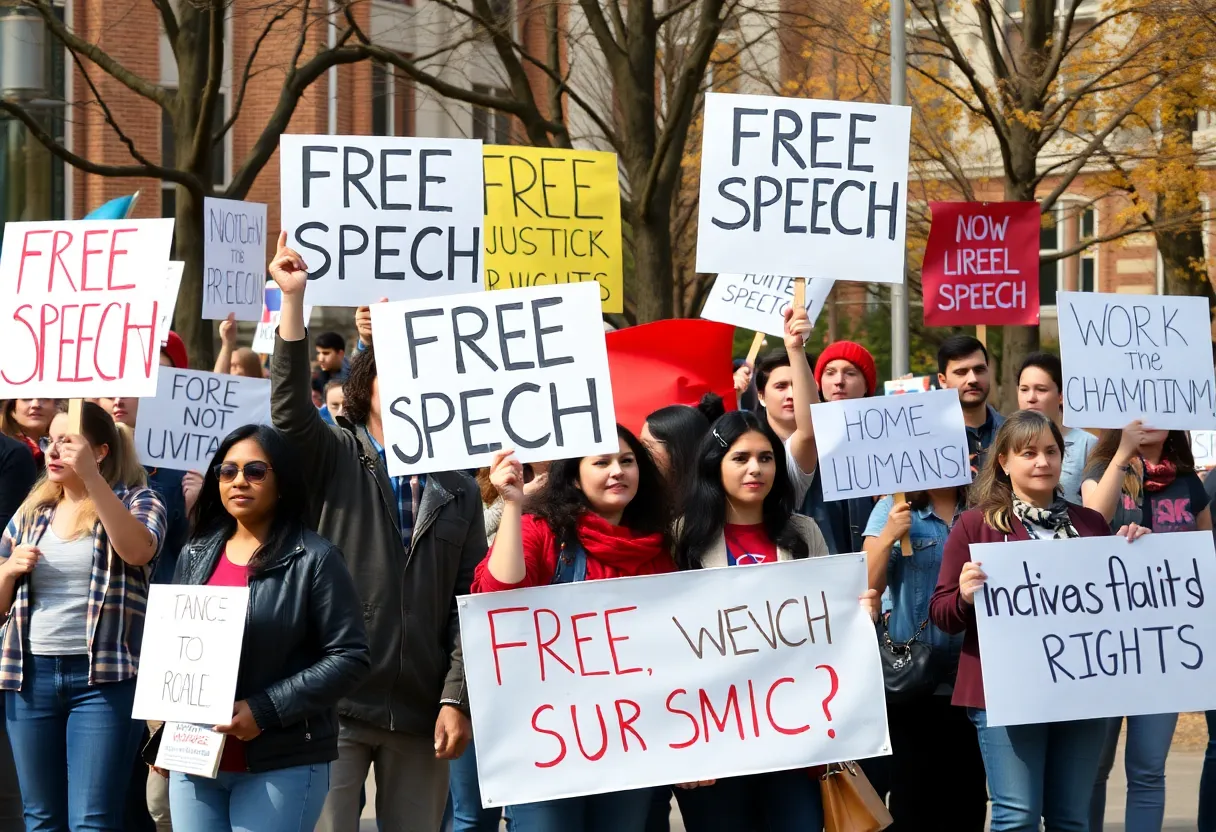

Protests erupt at Columbia University in support of Mahmoud Khalil's rights.
Columbia University graduate student Mahmoud Khalil was detained by ICE following his involvement in pro-Palestinian protests. His treatment has raised significant debates about free speech and the rights of activists in the U.S. The incident has triggered widespread protests and calls for his release, with concerns over the implications for activism and dissent at universities. A federal judge has temporarily blocked Khalil’s deportation, highlighting potential violations of his constitutional rights and sparking discussions about U.S. foreign policy.
Mahmoud Khalil, a passionate graduate student at Columbia University, has recently found himself at the center of a heated controversy after being detained by Immigration and Customs Enforcement (ICE). His detention has sparked a wave of protests, raising questions about free speech and the treatment of pro-Palestinian activists in the U.S.
Khalil, who has been a legal permanent resident since 2022, was apprehended during his involvement in campus demonstrations opposing Israel’s military actions in Gaza. Some protesters, including Khalil, have described these actions in very serious terms, even referring to them as genocide. This has made both supporters and detractors vocal about the situation, amplifying tensions across the university campus.
Following his arrest, Khalil was transported to a detention center in Louisiana, leaving many puzzled and concerned. The White House’s press secretary stated that there is a possibility of revoking Khalil’s green card or visa under U.S. immigration law if it is determined that his actions pose a threat to U.S. foreign policy and national security. This statement alone has stirred a lot of discussions about the implications for activism and dissent in the U.S.
Leavitt accused Khalil of organizing protests that allegedly harassed Jewish American students and claimed he distributed pro-Hamas propaganda on campus. A senior State Department official stepped in, suggesting that Khalil’s actions could have serious implications for U.S. foreign policy and make him eligible for deportation. These claims have intensified the scrutiny of his activities and raised eyebrows among civil rights advocates.
The news of Khalil’s detention has led to protests in New York, where demonstrators have marched demanding his release. They argue that this is more than just a legal issue—it’s a matter of free speech and the right to protest. Many view the government’s action as a political move aimed at suppressing pro-Palestinian voices, which has led to a heated national debate.
Some prominent figures, including city officials, have weighed in on the matter. New York City Mayor Eric Adams voiced a desire for fair treatment, reflecting on his own legal challenges. Additionally, opposition leaders have criticized the administration, claiming the detention bears authoritarian traits. There are concerns that Khalil’s situation represents a broader crackdown on those who dissent against the U.S. government’s foreign policy.
A federal judge in New York City has temporarily blocked Khalil’s deportation, citing the need for a hearing to explore potential violations of Khalil’s constitutional rights. His legal team is gearing up for this crucial hearing, eager to address the serious implications of his detention.
Columbia University has also found itself scrutinized for its handling of Khalil’s situation. Observers question whether the university has stood firmly enough to defend one of its own amid the chaos. Khalil is not just a student; he has been a bridge between the university administration and the protesting demonstrators, a role that has elevated his profile on campus significantly.
Khalil’s case is opening a Pandora’s box of discussions around the very fabric of free speech in academia and the state of activism against the backdrop of U.S. foreign policy toward Israel and Palestine. Many advocates argue that his detention could have a chilling effect on other students who may wish to express dissenting opinions or draw attention to global issues through peaceful protests.
As the situation unfolds, it remains to be seen how it will affect not just Khalil’s future, but the climate of free expression at universities across the nation. The conversations this case ignites could prove to be just as significant as the legal battle ahead.
News Summary A riot erupted at an ICE facility in Portland during a protest called…
News Summary A significant sinkhole measuring 12 feet wide and 20 feet deep was discovered…
News Summary The Holston Conference United Methodist Church is prioritizing accessibility by conducting disability audits…
News Summary Zachary Newton, 35, has been indicted on second-degree murder charges related to the…
News Summary Dulcie's Cafe, a food truck business in Knoxville, has reported the theft of…
News Summary In a significant display of civic engagement, an estimated 7,500 individuals rallied in…